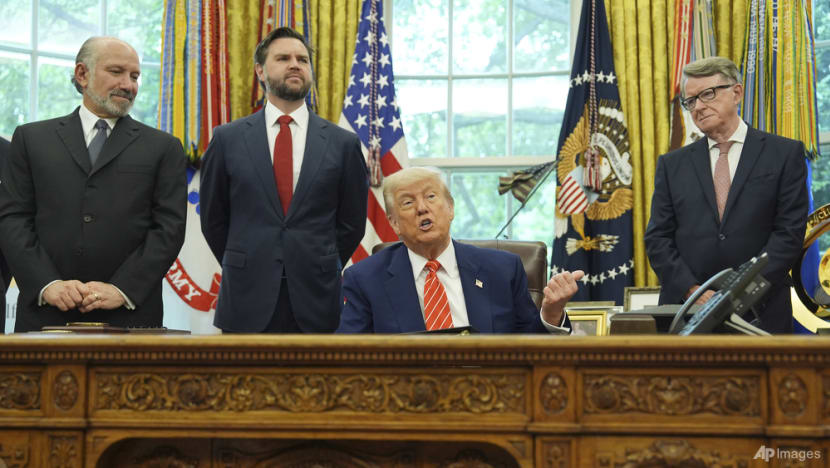Commentary: Trump announces a UK trade ‘deal’ about nothing
The White House made no mention of how the framework met the objectives of raising revenue or reshoring manufacturing, says Bloomberg Opinion's Robert Burgess.

President Donald Trump with (from left to right) Commerce Secretary Howard Lutnick, Vice President JD Vance and Britian's ambassador to the United States Peter Mandelson, making remarks on a trade deal between US and UK in the Oval Office of the White House, on May 8, 2025, in Washington. (AP Photo/Evan Vucci)

This audio is generated by an AI tool.
NEW YORK: Watching President Donald Trump reveal in the Oval Office what he described as “a tremendous trade deal” with the UK reminded me of the 1990s sitcom Seinfeld, the show that was literally about nothing.
To be clear, it’s not a deal but rather a framework for an agreement. In other words, US and UK negotiators still have a lot of work to do in coming weeks (perhaps months or even years like these things usually take?) to hammer out the details.
For now, the idea is to have the UK fast-track American goods through customs and reduce barriers on “billions of dollars” of agricultural, chemical, energy and industrial exports, including beef and ethanol.
More importantly, what was announced fails to accomplish any of the three objectives Trump originally put forward leading up to Apr 2’s “Liberation Day” for levying tariffs on America’s trading partners.
As a refresher, the first was using tariffs (which Americans pay for) to raise tax revenue to help close the federal budget deficit and pay for an extension of the Tax Cuts and Jobs Act of 2017 that is due to expire this year. The second was to bring manufacturing that migrated overseas back to the US, igniting a new “Golden Age” of America. The third was to achieve foreign policy goals.
WHAT WAS THE POINT?
None of those three objectives came up in Thursday’s announcement. So, what is the point? Trump’s trade war has upended the economy. The uncertainty he unleashed has paralysed businesses and caused measures of consumer confidence to collapse. Companies are openly warning of empty shelves coming sooner rather than later. On Thursday, a monthly survey by the Federal Reserve Bank of New York showed the outlook for inflation is soaring among households at the same time as they see future earnings growth slowing significantly. That’s a recipe for stagflation.
The International Monetary Fund slashed its estimate for how much US gross domestic product will expand this year by 0.9 percentage point, the most of any major economy and a testament to just how much Trump’s trade strategy is damaging the country. Little wonder why the MSCI USA Index of equities has dropped 4.34 per cent this year through Wednesday while the MSCI All-Country World Index that excludes US equities has surged 9.65 per cent.
“I view tariffs as extraordinarily regressive as a policy,” billionaire Citadel Chief Executive Officer and Republican donor Ken Griffin said at the Milken Institute Global Conference this week. “I actually think they’re contrary to the promise that the president made to the American people.”
Sure, US stocks surged as much as 1.6 per cent on Thursday, but that’s more likely a reflection of the market realising how little countries will have to give up to soften Trump’s threatened tariffs.
Indeed, as Bloomberg News noted, Thursday’s developments are a sign that Trump is seeking an off-ramp from his plan to raise US tariffs to their highest level in a century. “Today’s action also sets the tone for other trading partners to promote reciprocal trade with the United States,” the White House said in its statement.
A REBOOT
The problem for Trump is that America’s trading partners have seen how quickly he will backtrack on his trade threats as more Americans sour on his handling of the economy, especially as he openly talks about households having to make sacrifices.
“Somebody said, ‘oh, the shelves, is it going to be open?’ Well, maybe the children will have two dolls instead of 30 dolls, and maybe the two dolls will cost a couple of bucks more than they would normally,” Trump said during an Apr 30 Cabinet meeting. Telling Americans they have to tighten their belts is never a winning message for politicians.
If Trump stuck to the three objectives initially laid out, all this would be understandable and maybe the economic pain a bit more tolerable. Trump has lately focused, however, on his stubborn belief that America’s trade deficit is costing the country money. But as economists such as Nobel laureate Paul Krugman have pointed out, a trade deficit neither means trade is unfair nor that the country with the deficit is losing money. Instead, it is the flip side of large capital flows into the US, flows that help finance US debt and budget deficits.
Trump sees it differently. When asked today about his trade war causing cargo ships to stop coming into West Coast ports, potentially costing dockworkers and truckers their jobs, Trump replied “good”, saying it means the US wouldn’t be losing money. That sound like the perfect script for a Seinfeld reboot.















